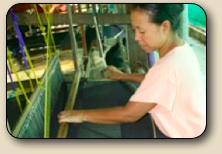The vast majority of international volunteer programmes are managed and run by organisations in "First World" countries, who make a living from the goodwill generated by projects in the "Third World". We disagree with this approach. We beleive that volunteer programmes should be managed by the local project itself with assistance from well meaning international volunteers. We beleive project directors should be encouraged to implement systems of accountability and promote policy formation that is acceptable to both international and local donors and volunteers.
To achieve this aim, Kids Worldwide has taken a revolutionary approach. We scaffold the projects and grade them according to a 5 stage system. It is expected that a project will advance roughly one stage per year, so that by the end of 5 years, a project will be capable of running independently of Kids Worldwide and provide a good quality of management and communication with their international partners.
We understand that there is often a large gap in what is perceived as acceptable management by international volunteers and locally run grassroot projects. There needs to be a compromise between the two and recognition of the challenges faced in developing nations.
Stage 0 - Assessment
Project contacts us. We send out a volunteer to check up on the project, possibly do some on site training with the director if a volunteer recommends project.
Stage 1 - Establishment of Volunteer Programme
Aim: To host 4 volunteers within 12 months of the project webpage going up on the site.
Clarify objectives and policies of the project especially with regards volunteer involvement.
Write a detailed volunteer manual, systems for orientation and supervision established.
Sponsorship programme for beneficiaries developed by volunteers and a system and structure implemented. All volunteer initiated sponsorships recorded in log book of some sort.
A volunteer coordinator selected from amongst the most suitable of the initial volunteers and trained up by Regional Supervisor to communicate with other interested international volunteers.
Evaluations submitted by all volunteers and Regional Supervisors check on the individual feedback from each volunteer, as well as discuss it with the VC and Director.
Stage 2 - Establishment of Systems
Training of local staff at the project about successfully integrating volunteers into their programmes. Meetings scheduled with and without volunteers for this purpose and to evaluate input and feelings from staff.
A regular 3 or 4 monthly newsletter is established which is sent out to all past, present and future volunteers as well as all supporters of the project.
Maintenance of an updated database with contact details and email addresses of all supporters.
Local fundraising and cottage Industy ideas discussed. Initiatives begin as soon as possible. Capital raised to start the venture.
Stage 3 - Building the Project -Development of Ethical Businesses
Clear business model established and underway. Capital has been invested in the project and regular financial reports provided to all sponsors and donors.
Strong leadership and management of these subprojects is encouraged with policies and employment contracts developed by local staff and beneficiaries.
Returning volunteers involved in the sustainability aspect of the project / management and staff training issues more than the "getting to know the kids" aspect.
Stage 4 - Building the Director and Volunteer Structure
Management strengths and weaknesses of the director should be fairly obvious by this time. Volunteer funds used to provide the director with a course in management suited to their needs and that of the project.
Volunteer team (past volunteers) is fully established and mobilized. Volunteers have their own forum for discussion of the project and are regularly asked to help out whenever possible. VC needs to consider how to engage each and every past volunteer in the project - could be helping upgrade the manual, writing new manuals for different aspects of the project, getting web designers on board, organising competitions, fundraising in their home town, publicity etc etc.
Return volunteers are frequent and welcomed for their expertise.
Stage 5 - Planning for Independence
Sister websites established which also tout for volunteers. A strong structure is in place for self-management of volunteers. Kids Worldwide will happily link to these sister websites and celebrate the growth of them.
Let's take the volunteer initiatives back to the place where they belong - not in the hands of wealthy nations!




